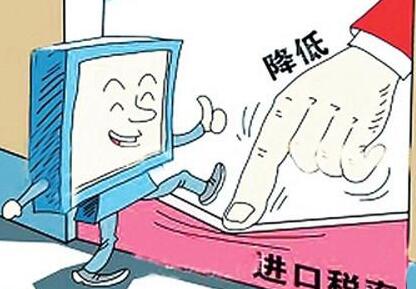The tariff reduction is only affecting imported household appliances, but for the current Chinese households and consumers, imported household appliances are no longer dominant and protagonists. More consumers have significantly increased their awareness of local Chinese goods. Imported home appliances are only a niche demand of small groups, and they have not been able to toss in the Chinese market.

On the last day of May 2018, the state decided to reduce the import tariffs on daily consumer goods to a large extent, and the average tariff rate for household appliances such as washing machines and refrigerators would be lowered to 8%. Some insiders believe that this will have a significant impact on the brand structure of China's home appliance industry and even the home appliance market, and the pressure on Chinese home appliance companies has surged. Is this a worry or a normal reaction to this view?
The country once again lowered the import tariffs on daily consumer goods: the average tariff rate for imported goods such as clothing, shoes, hats, kitchens and sports and fitness products decreased from 15.9% to 7.1%; the average tariff rate for imported household appliances such as washing machines and refrigerators was 20.5%. Decrease to 8%; the average import tariff rate on detergents and skin care, hairdressing and other cosmetics and some medical and health products will be reduced from 8.4% to 2.9%. The tax rate will be implemented from July 1 this year.
It can be seen that the import tariffs of household appliances such as washing machines and refrigerators have been adjusted the most, with an average reduction of 12.5 percentage points. Many people in the industry expressed concern about the competitive landscape of the domestic market of Chinese household electrical appliance enterprises. They believe that such a large reduction in tariffs will have a major impact on the competitive landscape of China's high-end ice-washing market. In this regard, smart home appliances do not agree, because tariffs only affect imported home appliances, and imported home appliances have long been not the protagonist of the Chinese market.
First of all, from the similar analysis of tariffs in history, the impact of tariff cuts on the average retail price of imported home appliances is not obvious. In other words, those who are worried about the pressure on Chinese brands because of the “foreign brand†price cuts can be assured. Even some categories are related to rising raw material prices and consumption upgrading trends, and the average market price will even be on the rise. More importantly, many imported home appliances are taking the high-end route and will not easily cut prices.
In fact, over the past two years, as China’s consumer demand has escalated, the impact of prices on consumer purchasing power has been quite limited. Appeals for health, higher quality, and better experience are clearly stronger. In response to this, the transformation and upgrading of China's home appliance brands has already begun, and has shaped many high-end brands that are recognized by the market, such as Casa Di, such as Little Swan, such as Fang Tai and so on. These brands are not only high-quality, but also more targeted at Chinese consumption habits and demand pain points, even if facing foreign competition is not down.
Moreover, the proportion of directly imported products that have been circulating in the Chinese home appliance market has not been high. According to the data of the General Administration of Customs and the National Bureau of Statistics, in 2016, the number of color TV imports in China was only 116,500, accounting for less than 1% of domestic sales; in 2017, the number of air conditioners imported was less than 30,000, accounting for negligible proportion. Of course, it is undeniable that the small household appliance industry, which has a high proportion of imported products and a large proportion of online sales, may receive relatively large impacts, but it is also within the normal market competition.
In fact, the government raised the tariff rate upwards, which also shows the government's confidence in Chinese home appliance companies. In the report, the goal is to adjust to the adjustment of consumer demand, and clearly pointed out that the relevant departments should implement tax reduction measures to prevent the increase in the price increase of the intermediate links, benefit the consumers and promote the competitiveness of the domestic industry.
Years of hardships and rains, China's home appliance market, and China's home appliance companies have already built a relatively stable development and competition system, and the ability to withstand risks and impacts is not small. For the current Chinese household electrical appliance enterprises, with the intelligence, high-end, quality, etc., they have found their own pace of transformation and upgrading. No matter how the outside world changes, as long as we firmly grasp the needs of users, and unswervingly go on, it is success.
Cbd Vape Products Oem,D8 Vape Pen Oem,Cbd Disposable Vape Pen Oem,China Cbd Vape Products Oem
Shenzhen MASON VAP Technology Co., Ltd. , https://www.disposablevapepenfactory.com